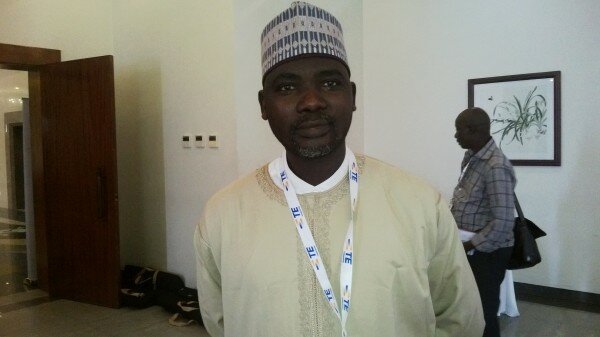
Mansur Liman, head of BBC Hausa.
BBC Hausa, the British Broadcasting Corporation’s (BBC) service covering the northern region of Nigeria, is currently struggling to increase its coverage due to a number of challenges.
HumanIPO spoke to Mansur Liman, head of BBC Hausa, about what the corporation was doing to improve and upgrade its services.
HumanIPO: Compared with politics and education, we do not know much about the state of the technological revolution and health in the northern region. Why is this?
Liman: I believe the problem is BBC Hausa has been known for news and current affairs and because of the limited time the Hausa service has on air which is a 30-minute programme, we also tend to concentrate on news and current affairs.
But that is not to say that we are not trying our best. We see that we bring out those kinds of stories – arts and culture, technology and health. We are trying our best to see that we increase the kinds of stories that we cover.
One of the recent things that we did is that there are stories there will drive audiences. We’ve realised that we will address that.
Around 96 per cent of visitors to bbhausa.com are visiting from mobile devices. Do you know the specific type of devices?
Most of them are using feature phones – the low tech kind of phones. And this is why we realise that we need to do something to enhance user’s experience by this particular group of people because they are the majority.
The proportion of people using smartphones in Nigeria on the overall is still small compared to the number of telephone subscribers in Nigeria.
Therefore we have to deal with this particular group of people that use feature phones. That is why we introduced what we call responsive technology.
What it does is it looks at the screen size of the particular phone you got and it adapts the material on bbchausa.com so that it comes out in the best possible manner for that particular device.
This enhances the user’s experience. People will get the best quality for their device. If you look at it on another device, the quality might increase. And then again if you have pictures, what the responsive technology will do is it will reduce the number of pictures for that particular low-end phone.
So that you will get access to the website as quickly as possible and the download time is reduced thus reducing the time and money you will spend in downloading the contents.
BBC Hausa was set up to ensure that in spite of low literacy levels in the north, the people still have access to quality, free-and-fair and unbiased journalism. When do you think the level would become acceptable to the BBC, and what will be the subsequent fate of BBC Hausa?
I think it’s not for me to say what happens for the BBC Hausa Service, but there is always a strategy for the BBC and that strategy is drawn by the board of the BBC to look at the conditions, whether there is relevance for BBC Hausa or there is no relevance.
When there is no relevance for BBC Hausa Service, then it can close. At the moment, I think and do feel there is relevance for BBC Hausa Service.
Firstly if you look at BBC Hausa Service, among the languages done by the BBC, BBC Hausa Service has got one of the highest numbers of audiences.
Still, the illiteracy level in northern Nigeria is still very high. Despite what you said about increasing, there are still high numbers of young children that are not going to school. It will take years for those children to read and write even if they enroll for adult education.
How is the crisis in northern Nigeria affecting the BBC’s operations?
It is affecting BBC operations because the crisis has dominated the news landscape whether you like it or not, not just for the BBC but also for the local media.
The violence has affected our reporters that are working in the region. There have been cases where we had to withdraw our reporters from places where the violence is very high, and then we try as much as possible to cover from afar which is very difficult for a journalist if you are not there.
It has affected us very much. In a way we have many people that refer to the BBC Hausa Service for independent news on the crisis.
Following the announcement of the emergency rule by the president, telecommunications companies cut off services in the north. How did that affect your operations?
It did affect us because the government decided to close telecommunications in the states that were affected by the emergency rule.
It affected us by limiting the number of people that we can speak to. Nevertheless, there are people who travel outside the affected areas, especially to neighboring Cameroon, and we get access to them and we speak to them about what is happening in the affected area.














